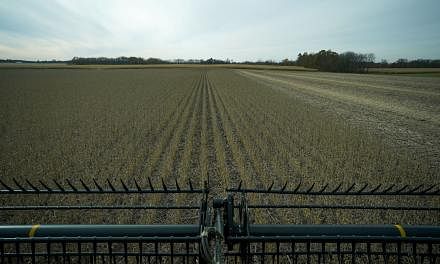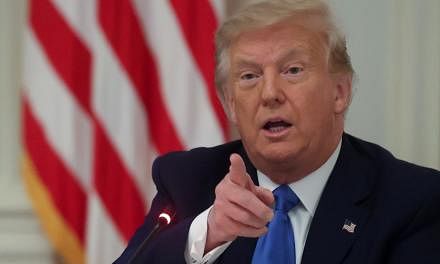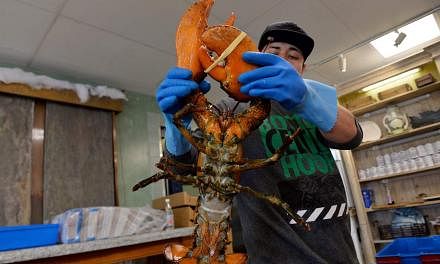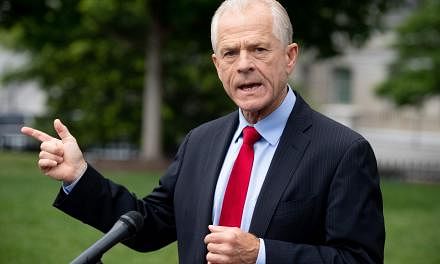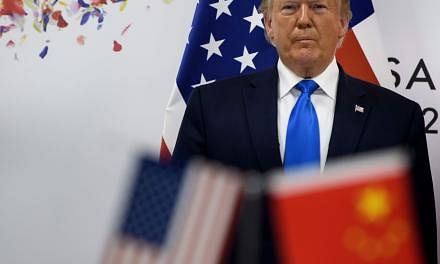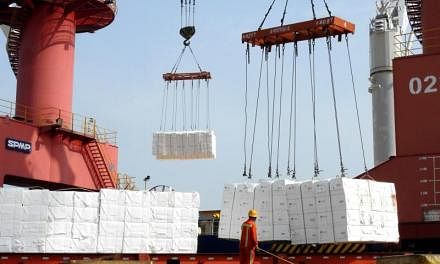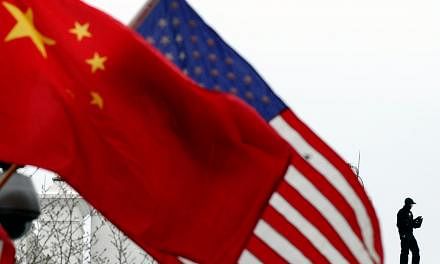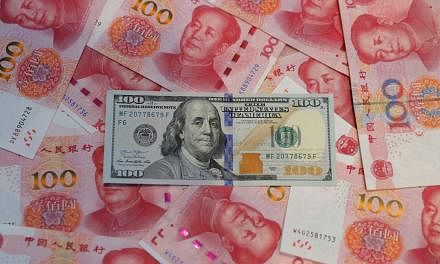BEIJING (REUTERS, BLOOMBERG) - China will halve tariffs on some US$75 billion (S$103.6 billion) of imports from the United States later this month, reciprocating a US action and likely satisfying part of an interim trade deal.
While the announcement on Thursday (Feb 6) comes about three weeks after the first phase of the trade pact was inked, it is also seen by analysts as a move by Beijing to boost confidence amid a conoravirus outbreak that has disrupted businesses and hit investor sentiment.
Casting doubts over the immediate outlook, however, was the prospect raised in a local media report that Beijing could invoke a disaster-related clause in the trade agreement, which might allow it to avoid repercussions even if it cannot fully meet the targeted purchases of US goods and services for 2020.
The cuts will be effective from 1:01pm on Feb. 14, Beijing time, according to a Ministry of Finance statement, the same time as when the US will implement already-announced reductions in tariffs on US$120 billion worth of Chinese products.
Chinese punitive tariffs on some 1,717 types of US goods that were adopted from Sept 1 last year will be lowered, with the rate on some dropping to 5 per cent from 10 per cent, and the others to 2.5 per cent from 5 per cent.
Other retaliatory tariffs China has imposed on US goods will remain, according to the statement. Further adjustments would depend on the development of the bilateral economic and trade situation, the ministry said.
"This like-for-like reduction is a reciprocal action, a consistent stance the Chinese government has adopted throughout the trade war," said ANZ chief economist for Greater China Raymond Yeung.
The reductions will cut tariffs on soybeans from 30 per cent to 27.5 per cent, although some traders say the impact could be limited as the 25 per cent tariffs remains in place. Duties on crude oil will fall to 2.5 per cent from 5 per cent that was imposed in September.
"Any move to de-escalate is always good. Especially, when the market is overwhelmed by the news about virus, good news about tariff is refreshing," said Tommy Xie, head of Greater China research at OCBC Bank in Singapore.
"The announcement shows China's commitment to implement the phase one trade deal despite the disruptions from the recent virus outbreak," said Xie.
The news was positive for financial markets and comes as Beijing seeks to shore up investor and business confidence in China as a virus outbreak casts deep uncertainty over the economic outlook.
The yuan hit its highest in two weeks, while Asian stocks and Wall Street futures also rallied after the announcement.
China's finance ministry said it hopes both sides can abide by the trade deal and implement it to boost market confidence, push bilateral trade development and aid global economic growth.
China's finance ministry said it hopes both sides can abide by the trade deal and implement it to boost market confidence, push bilateral trade development and aid global economic growth.
POTENTIAL DELAYS
While the proposed tariff cuts point to clear progress in US-China trade ties, the virus outbreak has cast doubt over just how soon the phase one deal could help China's slowing economy.
China's Global Times on Thursday reported Beijing is considering using a disaster-related clause in the deal due to the virus outbreak, citing an unnamed Chinese trade expert close to the government.
The phase one deal text contains a disaster clause that allows for implementation delays in the event of "natural disaster or other unforeseeable event".
US Agriculture Secretary Sonny Perdue on Wednesday warned the US would have to be tolerant if the fast-spreading virus impaired China's ability to increase purchases of US farm products under the signed trade deal.
Chinese foreign ministry spokeswoman Hua Chunying, when asked about the Global Times report at a daily briefing on Thursday, referred the matter to the relevant departments.
Some analysts had said following the trade deal that China may need to roll back some of the tariffs on US goods such as soybeans and crude oil in order to meet its purchasing commitments. Other analysts also noted such moves are expected to cushion faltering growth at home.
"Under the phase one deal, China has to meet a tough target to increase US import by US$100 billion this year, so a measure like this was necessary and expected," said Tomo-o Kinoshita, global market strategist at Invesco Asset Management.
"But at the same time, that they did this now points to their desire to support Chinese companies as the coronavirus epidemic will obviously deal a huge blow to China's growth," he added.

